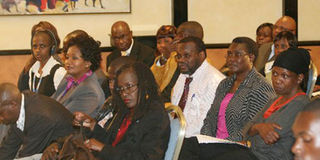Survey faults media over referendum coverage

Participants during the launch of a report on media at Serena hotel in Nairobi, August 24, 2010. The reports indicates that media in Kenya has improved on the coverage of issues, citing the coverage of the recent referendum elections.
Despite being hailed for its supportive role in educating Kenyans during the August 4 referendum - the media was not entirely faultless, a new report states.
The survey - 'The spotlight on media coverage of Kenya referendum campaigns’ has revealed elements of misconduct and other ethical lapses amongst several media houses as they undertook their duties.
Some organisations were accused either of engaging in biased reporting, the use of inflammatory languages, sensational reporting, misinformation or being sucked into the political propaganda campaigns peddled by politicians.
According to the findings of the research conducted by Peace Pen Communications, some radio stations were also heavily indicted for the use of abusive languages, which is against journalists professional conduct.
But despite this, said Ms Mildred Ngesa, a director of the organisation, the media generally exercised caution in their reports as compared to the run up to the 2005 referendum and 2007 general elections.
This perhaps explains why the media was rated by various opinion polls as the most trusted and reliable source of information on the new constitution prior to the referendum.
“Despite the few hitches that needed to be worked on, there has been a sense of caution generally amongst media houses, something that is highly commendable,” she said in Nairobi on Tuesday.
Ms Ngesa, while presenting the report, said the use by journalists of a potentially inflammatory quotes could have easily been misunderstood by viewers, listeners or readers, especially when quoted out of context.
And she gave an example of a quote by a politician who was reported as having said; “let him throw the first stone, we are ready for him and I am sure he will not speak again about it.”
The survey recommended that media houses need to be more vigilant and exercise caution when reporting conflicting opinion in national issues.
“Media needs to strive towards fairness and balance to avoid misleading and confusing the public,” the survey recommends.
“Journalists should understand that the words they speak and write have immense powers to hugely impact on their audience. Media houses should also invest on capacity building of their journalists.”
Mr George Kegoro, the International Commission of Jurist (Kenya) Executive Director urged the media to continue exercising responsible journalism as this will make the country move forward.
Similar remarks were also made by Mr Macharia Gaitho of the Editors Guild and Mr Ken Nyaundi - a commissioner with the Interim Independent Electoral Commission.
“A lot of the decisions we made during the referendum were informed by what occurred in 2007. We did not want a repeat,” he said.
At least 1000 people were killed and more than 350,000 others injured during the violence that occurred after the release of the hotly disputed presidential results.
He said the media took a great deal of time to understand the new constitution, saying this was the reason why most Kenyans turned to it in seeking information on the new law.
Mr Gaitho proposed that in future elections, media houses in the country should not shy away from taking positions on critical issues on national importance.
“We should be able to take a stand on national issues without being accused of being biased,” he said.
Mr Nyaundi said negative reporting by journalists must be resisted at all costs.


